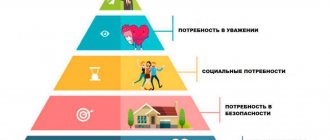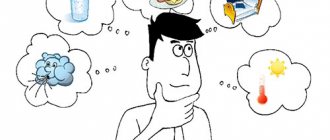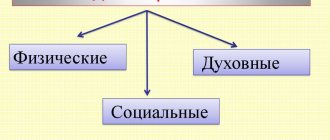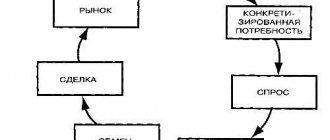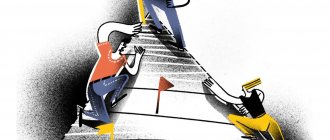Social, spiritual and material needs
The needs are so diverse that there are many classifications of them. In classical science, it is customary to distinguish 3 groups of needs: social, spiritual and material. The first place is given to material satisfaction: in clothing, housing, water, food. The means by which needs are satisfied are called material goods. These can be essential or luxury items, as well as services (consultations with a lawyer, doctor, car repair, etc.).
Spiritual needs are associated with the need for the development of the individual as a personality. They are satisfied by obtaining an education, reading books, engaging in art, and possessing information.
Through the participation of people in public and collective activities, socio-economic needs are realized: in trade unions, parties, public foundations, creative circles, and charitable organizations.
Concept
Human social needs indicate that an individual cannot live alone. He craves love, friendship, and other positive feelings that appear when two or more people communicate.
Unfulfilled social needs do not lead to death, but can seriously reduce the quality of life. Therefore, it is necessary to think about how to implement them.
By the term “social needs,” psychologists understand this type of need that is satisfied not only by communication. It is important for an individual to receive assessment of his activities and feedback from other people.
This happens because a person is not only a unit of a biological species. His psyche is represented by a complex and multicomponent mechanism, which differs from that of an animal.
The individual wants to do something meaningful for the group that will give him recognition and praise. If he once received this, he strives to repeat the experience. It is the need for positive emotions that serves as the impetus for carrying out useful activities.
Psychologists believe that it is social needs that can contribute to the development of an individual’s personal sphere. It includes a person’s actions, his motivation, peculiarities of information perception, etc.
Psychologists are sure that it is social needs that force an individual to act actively. To gain recognition, he works and participates in public life.
For a full-fledged existence, a person needs to satisfy two groups of needs. The first is the need for food, drink, rest, etc. The second is the need for communication and recognition.
Other classifications of needs
There are other divisions. For example, according to the types of subjects of needs, they are divided into public, collective, family and individual. Representatives of neoclassical science in economics (for example, A. Marshall, an English economist) divided them into relative and absolute, lower and higher, urgent and those that can be postponed, indirect and direct. Needs are also identified by sphere of action: communication, labor, recreation (restoration of working capacity, rest) and economic needs. Let's take a closer look at the last type.
Economic needs are part of human needs, for the satisfaction of which there must be production, exchange, distribution and consumption of services and goods. It is this type of need that is involved in the interaction between unsatisfied demands and production.
Types of human needs
What are the needs of a person? Many studies by psychologists, sociologists, and public figures have been devoted to this issue. The types of needs can be classified as follows:
- needs related to the field of activity (communication, work-rest, cognition);
- object needs (material, social, biological, spiritual, moral and ethical);
- needs by degree of importance (dominant, secondary);
- functional (natural, dictated by the norms and culture of society);
- subjective (individual, group).
Maslow's theory
The theory of A. Maslow, an American sociologist (his photo is presented below), has gained great popularity in modern Western literature. All needs, in accordance with this classification, can be arranged in the form of a pyramid, in ascending order from material (“lower”) needs to spiritual (“highest”) needs.
The following types are distinguished:
- physiological needs (drinking, eating, etc.);
- safe (protected from fear, anger and pain, etc.);
- in social connections (friendships, family, religious);
- in acquiring social status (approval, recognition);
- in self-expression (realization of personality abilities).
This classification can be presented in the form of a pyramid, at the top of which there will be needs for self-expression, and at the base - physiological. Lower order needs, according to Maslow, are physiological and safety needs, and higher order needs are for social status and self-expression. Higher needs do not arise until the lower ones are satisfied.
Environmental human needs
Natural human needs are realized in direct contact with nature. Fresh air, clean water, a certain geographical landscape, climate - all these are components of the natural environment of man. Society has managed to protect itself from external negative influences with the help of various technical devices, for example, water goes through several degrees of purification before it flows from the tap. Man greatly influences the environment in both saving and destructive ways.
Environmental needs relate to biological needs and ensure human life, therefore it is important to cultivate high-level environmental needs from childhood:
- desire to preserve and increase natural resources;
- maintaining cleanliness;
- environmental friendliness at the level of thinking, actions and relationships with people.
Interrelation and interdependence of needs
You can supplement the classification of needs by highlighting the following types: irrational and rational, concrete and abstract, unconscious and conscious, etc. But it should be remembered that any classification is quite conditional, since economic needs of one type or another are interdependent and interconnected. The material needs of people appear not only under the influence of the vital functions of the human body, but also to a significant extent under the influence of scientific, technical and economic development of society, social and spiritual guidelines. And the social, intellectual and spiritual needs specific to any social stratum and individual person arise under the influence of material ones. They largely depend on the degree of satisfaction of the latter.
Ways to satisfy modern man
Spiritual needs - what is it for people
The definition of social needs has changed as the world has evolved. In current conditions, people are increasingly excluded from society. The Internet, social networks, gadgets - all this leads to the fact that individuals have little face-to-face contact.
Important! It is impossible to clearly name effective ways to satisfy needs, since they are different for each person.
There are general recommendations that will allow you to realize a social need. The individual organizes his own activities, so he must communicate, make contact, meet other people and take initiative.
The ability to conduct conversations does not appear with the birth of a person. Social skills are trained through practice. You need to constantly communicate and get to know each other.
Another way is to learn new things. Meetings, seminars, training courses - all this allows you not only to gain knowledge, but also to acquire new social connections.
A person must understand who he is. To do this, he needs to devote time to reflection. Such self-analysis allows you to get an idea of your pros and cons. Self-esteem appears only in self-confident people.
Historical nature and dynamism of needs
The economic needs of society are historical in nature. The methods of satisfying them and their extent depend on the life demands and habits with which society as a whole, social strata and individual people were formed, that is, in what socio-historical conditions they find themselves. The economic needs of society are dynamic. Social progress, human improvement, intensity of information exchange - these are the factors under the influence of which requests change.
Continuous changes in the qualitative and quantitative ratio that economic needs and benefits undergo, a steady increase in the process of evolutionary development of society, is the law of increasing needs. Their change occurred at a relatively low rate, smoothly over many centuries and millennia. Today, the rate at which economic needs and goods are growing has accelerated significantly. At the same time, there is a social uniformity in their rise, and the emergence of needs of a higher order among ever larger masses of the population.
Human social needs
When a person's basic needs are satisfied, his life is filled with meaning and the desire to be useful to society. Social needs are conventionally divided:
- " For myself
". The basic thing here will be a person’s desire to realize himself in society, to self-identify and take a worthy place or position. The desire for power. - " For others
". Serving for the benefit of society and country. The need to protect the weak, the desire for altruism. - " Together with others
." The need for unification to solve important problems aimed at the protection or prosperity of a group or state.
Features and classification of economic goods
They must be produced before they are used. Therefore, the ultimate goal of the production activity of any society and the basis of its life is precisely the creation of this kind of goods. Economic needs and resources, as well as various benefits, have a rather complex classification. Benefits are divided, depending on the criterion underlying them, into several groups.
- Long-term, which involve repeated use (book, car, videos, electrical appliances, etc.) and short-term, which disappear after a single use (matches, drinks, meat, bread, etc.).
- Substitutes (interchangeable) and complementary (mutually complementary). Not only production resources and consumer goods are classified as substitutes, but also transport services (car-plane-train), leisure services (circus-theater-cinema), etc. Speaking about complementary goods, we can cite as examples a chair and a table, a pen and paper, a car and gasoline, which, complementing each other, satisfy human economic needs.
- Present goods that are at the disposal of one or another economic entity, and future ones (their creation is only expected).
- Intangible and tangible.
- Private and public.
- Indirect and direct.
- Means of production and consumer goods.
Needs and resources of society. Their structure.
Home Favorites Random article Educational New additions Feedback FAQ⇐ PreviousPage 7 of 32Next ⇒
Economic theory has established that the development of human society is based on the development of social production (economy), which, in turn, determines the development of other spheres of human activity (politics, spiritual life, etc.). This follows from the fact that the purpose of social production (economy) is to satisfy the needs of society, i.e. individual (person) and institutions. Satisfying needs is the immediate goal. This goal is refracted through the prism of the goals of economic entities. So, the goal of the company
(enterprise, entrepreneur)
is maximizing profits or minimizing production costs
;
an individual (non-entrepreneur) as a consumer - maximizing income
(salary, interest, rent, etc.)
and distributing it among economic goods in such a way that this leads to maximizing the satisfaction of all his needs, i.e.
maximizing the utility function. This is achieved if the ratio of marginal utility (MU) to price (P) is the same for all types of goods and services: ;
society (represented by the state)
–
economic growth, increased efficiency, full employment and socio-economic stability, and in materialized terms – maximization of national wealth (NB).
All these goals in relation to the immediate goal act as means of achieving it. The purpose of production, expressing the interests of the owners, acts as the driving motive of people’s economic activity
,those.
in the name of which people develop and improve production. Ultimately, production is always subordinated to the interests of the owners of the means of production, and economic interests represent conscious needs
.
The presence of multiple goals results from the variety of needs
.
Needs, unlike desires, are objective, because express the need for material and spiritual benefits to ensure human life and social activity. The term " economic need"
"is defined (interpreted) in two ways:
a need that needs to be satisfied
(pessimists);
internal motive
,
inducing economic activity
:
It is he who pushes a person to active economic behavior (optimists).
Needs
Societies
are diverse,
they are usually classified according to various criteria.
From the point of view of whether they are embodied in things or not:
- material
(needs for food, housing, clothing);
- intangible
(spiritual needs, service needs)
From the point of view of dividing consumption into productive and
unproductive (i.e. consumption is carried out in or outside of production; or the method of consumption - by production or by a person):
— production
(needs for raw materials, means of labor, etc.), which are divided into material and intangible;
- non-productive
(
personal
, i.e. human needs), which
divided into tangible and intangible
Personal needs
, in turn, are divided:
According to the degree of need to satisfy them for a person:
- primary
(
lower
), satisfying vital needs
human (food, housing, clothing), without which human life is impossible;
- secondary (higher)
– higher level needs, i.e. All
the rest (cinema, sports, entertainment, luxury goods, spiritual needs). This division is arbitrary, since for different people the understanding of primary and secondary needs is different: for some, luxury goods are essential items, and, in addition, the relationship between them changes with the development of society.
By the nature of the needs:
- material,
including basic necessities and
luxury goods (ranked according to necessity);
- spiritual
(getting an education, becoming familiar with culture);
— social
(labor needs, participation in management, living environment).
The importance of the last two categories of needs increases with the development of society.
According to the nature (form) of manifestation:
- hidden
(latent);
- open (
conscious).
By urgency of satisfaction:
- subsistence needs -
ensure human existence, arise from a sense of self-preservation (food, clothing, housing);
-need for choice
– all other needs relate to alternative needs, the type and size of which depends on the natural and social environment (books, magazines, fashionable clothes).
By method of satisfaction:
- individual
– needs are satisfied by the person himself;
- collective (public)
– a group of people (related to costs: building schools, insurance, maintaining public safety (police), political authorities).
Needs are the driving force behind economic activity; they arise and change qualitatively and quantitatively under the influence of the development of technology, fashion, and advertising. There are more complex classifications of needs (by gender, age, climatic conditions) that must be taken into account for marketing
(marketinq), based on the study of consumer demand related to needs, and
management
(i.e. management), which is based on motivation. There are various theories (models) of motivation. The most famous is the hierarchical theory of needs of the American psychologist A. Maslow, on the basis of which a hierarchical model of motivation was developed: from the entire variety of human needs, he identified the five most significant basic needs, arranging them in the form of a hierarchical pyramid consisting of five layers (levels):
Level I (lies at the base of the pyramid) – physiological needs for
reproduction of people (food, clothing, housing, physical movements, rest);
Level P – security needs
(the existence of oneself and one’s loved ones, in the stability of living conditions, job security, accident insurance, etc.);
Level III – needs for love and respect
(in affection, belonging to a team, communication, caring for others, attention to oneself, participation in collective work, etc.);
IV level
–
needs for recognition
(respect for “significant others”, career and professional growth, status, prestige, positive assessment of merits and merits);
Level V – needs for self-actualization
(realization of potential opportunities, abilities, talents, their development). Self-actualizing individuals are an example of normal and desirable personality development for society, embodying human potential to the maximum, although real life conditions do not always contribute to this (Fig. 2.1).
The law of increasing needs means an increase and constant change in needs in their structure, quality and quantity with the development of society. Not only new needs appear, but old ones also die off, and the relationship between types of needs changes. The effect of this law must be taken into account both at the macro and micro levels. This is facilitated by: incentive
as a direct external stimulus;
motive
as an internal, dictated by the conscious goal of the individual, aspiration based on his needs and interests;
motivation
(management method) as the purposeful creation of favorable conditions for the formation of motives as spiritual values.
Figure 2.1 A. Maslow’s pyramid of needs
Each of the five levels of needs is taken into account in management. Interests arising from levels I, II and III of needs characterize the so-called “economic person”. At these levels, stimulants are formed,
on the basis of which a labor incentive system is created. And only levels IV and V of needs are capable of playing a motivated role. Here persistent spiritual interests arise - motives on the basis of which a system of labor motivation is created. An individual, oriented in his life and activities towards a certain set of motives, is called in theory by the term “social person”. The development potential of this type of people is practically limitless; only favorable conditions are needed, and the benefits brought to them are greater.
All levels of needs are interconnected. The implementation of the first three levels of needs is necessary for both the “economic” and the “social person”. But the highest results are achieved by highly developed individuals oriented towards creative work.
Needs are insatiable or limitless
. This means that the needs cannot be fully satisfied: all the needs of all people at the same time, because:
- for each person at any given moment in time there is a fairly large list of unmet needs;
— needs grow and change (the law of rising needs applies): new needs appear (for personal computers, electronic watches, VCRs, microwave ovens), which add to the list;
- Having satisfied a simple need, each of us tries to satisfy a more complex need.
Thus, at any given moment, the individuals and institutions that make up society experience many unsatisfied needs. Some of these needs - food, clothing, shelter - have in common the biological needs of humans. Others arise under the influence of customs and habits established in society: specific types
clothing, housing, which arise from the general social and cultural environment of our habitat. Over time, needs change and multiply.
Degree of satisfaction of needs
indicates the level and quality of life, depends on the development of production and the solution of social problems. For example, a low degree of satisfaction of needs leads to impoverishment and negatively affects labor and activity of the population. On the other hand, the standard of living affects labor efficiency.
Means that satisfy needs
, are called
goods
(use values, products, goods, services). There are benefits:
— economic
– are available in limited quantities, their production requires costs, and they have a price on the market;
- non-economic
(air, wind, rain) - are not limited, are not the subject of economic activity.
Economic benefits
classified:
1)by its nature:
- real (or goods)
, having a material (physical) nature (food, raw materials);
- services,
having an intangible (incorporeal) nature (transport, information services, etc.) - their production and consumption are carried out simultaneously;
2) according to the purpose of use (who uses it - an individual or a company):
- straight
(
consumer
);
- indirect
(
production, investment
), serving for the production of other goods;
3)by period of use:
- long-term
(
long-term
) – reusable (refrigerator, car);
- short-term
(
short-term
) – one-time use (bread, meat, drinks);
4) according to the ratio of consumption:
- interchangeable
(
substitutes
) – used on alternative
basis (butter-margarine, plane-train-car);
— complementary
(
complementary
) – used simultaneously
(tape recorder and cassettes, table and chair);
5)In terms of satisfaction time:
- real;
- future.
1.2 Economic resources: composition, specificity, interaction and development, classification and properties.
To obtain missing consumer benefits, indirect (investment, production) economic benefits are needed, i.e. resources
as factors of production
in the production process , i.e. factors of product creation, its use value.
Economic resources (factors of production)
are economic goods used to produce other economic goods.
In the composition (structure) of economic resources, the domestic economic theory of the Soviet period (following Marxism) identified three factors of production: objects of labor (ST), means of labor (ST)
, which together make up
the means of production (SP), and labor force (PC),
in detail analyzed in “Capital” by K. Marx.
Modern economic theory (following Economics) offers a more enlarged and vaguely reasoned structure, which includes:
1) material
resources -
land
or
raw materials
, and
capital
(or
investment
resources), represented by means of production (SP), i.e. real capital, in contrast to money capital (or financial capital), which represents the valuation of the means of production and therefore is not an economic resource;
2) human
resources -
labor
(labor or various types of work) and
entrepreneurial ability.
And so, labor
-
this is the totality of a person’s physical and mental abilities
,
his ability to work
. The ability to work and work itself are an exclusive property of a person, which are not identical to each other. In the labor process, labor power is consumed, and labor power consumption is labor, i.e. expedient human activity aimed at changing objects and forces of nature in order to satisfy his needs. In the process of labor: firstly, there is a transformative activity on nature; secondly, knowledge, experience, skills, qualifications are accumulated; thirdly, the person himself changes. Therefore, we can say that labor created man and is the main factor in his development and improvement.
It must be emphasized that the workforce:
- this is a personal factor of production, the carrier of which is a person;
- the main productive force in society (NTR strengthens this role);
- as the social division of labor deepens, it turns into an aggregate
labor power, since the use of individual labor power becomes possible in a certain social combination with others;
- a commodity in a market economy (under capitalism), for transformation into which two conditions are required: 1) legal freedom and the sale of one’s labor power for a time; 2) the hired worker must be deprived of the means of production and means of subsistence.
The subject of labor is what human activity is aimed at, or the material being processed.
Objects of labor are heterogeneous in their composition and are divided into:
-primary –
objects given by nature that are being processed for the first time (coal, ore, timber);
- secondary
– objects of labor that are a product of previous labor (ore in the washing process, raw materials, semi-finished products, etc.); every raw material (metal, cotton, cement) is an object of labor, but not every object of labor is a raw material;
- universal
(nature, air, water, earth);
- new
– objects of labor that appeared in connection with the development of scientific and technological revolution with predetermined properties that do not exist in nature.
Means of labor are a thing or a set of things that a person places between himself and the objects of labor and with the help of which a person influences the object of labor (nature).
Instruments of labor act as a continuation of natural human organs and are divided into:
- natural
(earth, stick, stone, etc., tamed domestic animals, organic fertilizers, as well as worker’s body organs);
- artificial
(technical), i.e. artificially created by man.
Labor tools are divided into several types:
— mechanical means of labor (tools)
: tools, mechanisms, machines, equipment - Marx calls them
the skeletal and muscular system of production.
Mechanical means of labor in the conditions of machine production have developed into a system of machines with three components: a working machine, an engine and a transmission device. They best characterize the degree to which people have mastered the elemental forces of nature and are an indicator of the development of technological progress, labor force and production relations;
— means of labor that serve to store objects of labor
(pipes, barrels, baskets, vessels): Marx calls them
the vascular system of production;
- general conditions of production
- all the material conditions necessary in general for the labor process to take place: land is the universal means of labor; buildings, structures, canals, roads, dams, etc.;
— control device
(Computer), which performs the functions of mental labor: appeared in connection with scientific and technological revolution, processes not energy (like physical machines) and not matter (like chemical devices), but
information
, which, by analogy with Marx, can be called
the nervous system of production.
The development of the means of labor leads to the fact that a person is gradually forced out of the direct production process and becomes close to it.
From the point of view of the result of the production process, means of labor and objects of labor act as means of production
(SP – material factors of production).
The interaction of all factors of production forms the process of production (or production), which is not the sum of its factors, but forms a complex system of their interaction. This is interaction
is achieved, firstly, through
technology,
which is
methods of human influence on objects of labor discovered by science and practice
, which are based on the mechanical, physical, chemical properties of production factors;
secondly, through the organization of production
as
a special production management system,
which ensures the unity and coherence of the functioning of all factors. At the same time, changes in technology have an impact both on the workforce, placing new demands on it, causing the need to improve its qualifications, and on the organization of production: the social division of labor deepens, specialization and cooperation develop, production is concentrated, which leads to an increase the social nature of production, to the formation of the national economy.
With the development of social production, the appearance of factors of production and the nature of their interaction change. Thus, energy
which previously coincided with human motive power (mechanical, atomic, intranuclear, nuclear, energy of chemical processes), and information - as a condition for the operation of machines (control device), without which the functioning of production factors is currently impossible.
Economics adds another pecypc - entrepreneurial ability - a special type of human resource, which consists in the ability to most effectively use all other factors of production (resources)
. Entrepreneurial ability (entrepreneurship) is considered separately due to its specific role in a market economy, which is revealed through four interrelated functions of an entrepreneur. The entrepreneur undertakes:
- initiative to combine resources into a single production process
goods and services. At the same time, he is the driving force of production and an intermediary, bringing together other resources to carry out a process that promises to be a profitable business;
—
the difficult task
of making major decisions in the process of doing business;
— introduction of innovations on a commercial basis
(new products, production technologies, forms of business organization);
- risk
, since in a market economy the entrepreneur’s profit is not guaranteed, so the entrepreneur risks time, labor, business reputation, and invested funds (both his own and others’).
The use of various criteria when classifying production factors (resources) allows us to identify diverse forms of their manifestation:
1) in terms of reproducibility:
- non-reproducible
– minerals included in the composition of objects of labor;
- reproducible
(natural resources (soil, water basins, flora, fauna), labor resources (HR), objects of labor (raw materials), means of labor), which, in turn, are divided according to the method of reproducibility:
- naturally reproducible
(labor, natural resources);
- economically reproducible
– objects of labor (raw materials), means of labor;
2) from the point of view of the environment of involvement:
- exogenous
, involved from the external environment (non-reproducible, naturally reproducible);
- endogenous
– internal resources of the economic system (economically reproducible);
3) depending on the time during which they function and the way they are presented in the manufactured product:
- providing
(means of labor and labor resources) - function in a number of production cycles and are not embodied (materially) in the finished product;
- embodied
(objects of labor) – function during one production cycle and form the material and energy basis of the manufactured product;
4) from the point of view of the labor process - all resources participate in the creation (are means of creation) of the product, its use value:
- objective (real, material):
ST+PT=SP;
- subjective (personal)
: RS (labor resources);
5) from the point of view of social form, i.e. socio-economic form, characterized by a social way of connecting labor and means of production, all factors of production (resources) act as social means of realizing this type of property:
- funds
(F), represented by means of production and labor, in pre-market Russia (under socialism);
- capital
(K) – in a market economy;
6) from the point of view of creating and increasing value (Marxist division), capital (funds 1) is divided:
- constant capital
(c) – that part of the value of capital (funds) that is converted into means of production and does not change its value during the production process; represented by means of production;
- variable capital
(v) – that part of the value of capital (funds) that turns into labor and changes its value during the production process; represented by labor force, hence K(F) = c + v. The change in this part of capital is associated with the creation of surplus value (m), which is the result of the exploitation of hired labor: Labor force in the production process transfers the value of funds with its concrete labor
production (c) into a finished product and creates a new one with abstract labor
______________________
1The division into constant and variable, associated with the exploitation of hired workers, by Marx applied only to capital. But since in pre-market Russia (under socialism) the fact of exploitation was established, this division can also be attributed to funds.
cost (v+m), resulting in the cost of the product. W = c+(v+m)
The rate of surplus value ( ), expressing the degree of exploitation, is determined by the formulas:
%=
;from here,
where PP, PT, PV are surplus, respectively, product, labor and time;
NP, NT, NV – the necessary product, labor and time, respectively;
Let's assume that c=100 units, v=200 units, ,=100%, then:
K=100c+200v=300
W=100+(200v+200m)=500, i.e. capital increased by 200 units.
7) From the point of view of the nature or method of turnover of value, capital (funds) is divided into:
- main capital
(fixed production assets) – F (OPF) – part of the productive capital that participates in a number of production cycles, and the cost of which is transferred to the finished product in parts; ST is represented (buildings, structures, machines, mechanisms);
— working capital
(working production assets) – τ (OPF) – part of the productive capital, the value of which is entirely transferred during one production cycle to the finished product; PT+RS is presented (conditionally), since it does not transfer its value, but creates new value
 From the point of view of the scope of functioning of funds (F):
From the point of view of the scope of functioning of funds (F):
- production
(PF) – in production (OPF+ObPF);
- non-productive
(NF) – in the non-production sphere;
include: fixed non-productive funds
(FNF) - housing stock, holiday homes, sanatoriums, kindergartens, nurseries, sports grounds, medical institutions, cultural centers, and
circulation funds
(CF), which consist of products ready for sale and the funds needed for the purchase of raw materials, fuel, payment of wages, etc.
Fixed assets
(Sosn) =OPF +ONF
Working capital
(Sob) = ObPF + FO, the connection between which exists in the process of movement (circulation): they pass into each other and are completely renewed after each circulation (cycle).
All resources (factors of production) have one common property: they are always limited. Hence, the volume of production of economic goods (goods and services) is limited and it is impossible to satisfy all the needs of all people at the same time. The limitations of goods, including resources and technologies, can be different and include:
- rarity of goods
, determined by the volumes and degree of replenishment of stocks of various goods, characterizing their limitation relative to each other;
— insufficiency of goods
– limited benefits relative to the needs for them.
As a result, the limited nature of goods
, including resources and technologies, seems to be an almost
universal
property of goods included in the sphere of people’s economic activity.
It should be noted that not only factors are limited, but also physical and intellectual abilities, and the time that each person can devote to one or another activity. In a word, a person lives in a world of limited opportunities. And although people have significantly expanded the scope of these restrictions over the millennia of their lives, even now, as at any other time, the limited availability of resources remains and imposes restrictions on the size and possibilities of growth of social and personal well-being.
Resource limitations are relative
, since it consists in the fundamental impossibility of simultaneous and complete satisfaction of all the needs of all people.
From the limited resources comes the need for their optimal distribution
, requiring the establishment of some principles for the distribution of goods and services,
economy, efficient use
and
competition for their use between alternative purposes
(and not between people). For example, oil can be used to produce: a) fuel (boiler, diesel, jet); b) substances to be obtained after recycling (synthetic fibers, dyes, detergents, plastics); c) foreign exchange earnings from oil exports for purchases (food, medicine, other consumer goods, equipment for the light, food and chemical industries, the latest equipment and technology). And all these are alternative purposes for the use of oil, the production volumes of which are declining in the country, and if, for example, its exports are increased, then domestic supplies will be reduced.
“Economics” believes that the problem of choosing directions and methods of using limited resources for various competing purposes is the main task, and methods for solving this problem are the subject of economic science.
⇐ Previous7Next ⇒
Material and intangible benefits
The development of economic needs occurs in the direction of increasing consumption of material and intangible goods. The first are the result of the functioning of one or another material production (construction, agriculture, industry, etc.). These are clothing, food, cars, buildings, household appliances, sporting goods, etc.
The second (intangible benefits) exist in the form of activities: treatment, training, communal, household or transport services for the population, etc. Intangible goods are fundamentally different from material ones in that the consumption of the latter is always preceded by the process of their creation. Both in space and in time these two processes are separated. Unlike goods, the production of services at the same time acts as their consumption, that is, as a rule, there is no time gap.
Consumer society: PROS and CONS
It is impossible to look at consumer society by pointing only to its shortcomings and destructive effects on people and society. Therefore, we invite you to get acquainted with the opinions of public figures, sociologists, economists and psychologists both against this phenomenon and in its favor.
So, what bad do experts see in the consumer society:
- consumer society contributes to the formation of dependence and lack of independence;
- the main goal of a person is the consumption of goods and services;
- education, advanced training and work become secondary things;
- the consumer society is based on natural resources that are practically irreplaceable;
- for highly developed countries where there is a consumer society, third world countries serve as a raw material appendage;
- the responsibility of people at different levels is reduced;
- at the top rung of society there are people who move progress, and there are very few of them; the rest of the people are needed only to maintain the uninterrupted operation of equipment and maintain the functioning of the market system;
- moral values recede into the background: mental, moral and spiritual development becomes insignificant;
- personality in a consumer society is degrading, and mass culture is experiencing severe decline;
- in a consumer society it is easy to manipulate people’s consciousness and deceive them;
- economic goals dominate all others.
But in contrast to the opponents of the consumer society, its “defenders” cite the following arguments:
- through consumption, responsible and good government emerges, aimed at long-term social stability (necessary for a consumer society);
- manufacturers strive to improve and create new goods and services that contribute to progress;
- high consumer standards motivate people to continue learning, improve their skills, work hard and earn money;
- consumption reduces social tension;
- the desire for consumption displaces religious and national tensions, thereby reducing extremism;
- people in a consumer society are much less risk-averse;
- The consumer society gravitates towards higher environmental standards and environmentally friendly products, thereby prompting their creation by producers;
- By consuming raw materials and goods from third world countries, the consumer society contributes to their development.
The essence of professional opinions in our article is presented briefly, and if you want to understand the details, we once again recommend reading the works of Jean Baudrillard and Erich Fromm, as well as Georges Perec, Naomi Klein, Herbert Marcuse, Guy Debord, Lindstrom Martin.
However, the ideas presented are quite enough to form a more or less objective opinion about consumer society. We do not undertake to judge whether this is good or bad, and in any case it is up to you to draw conclusions.
Public goods
Public goods are those goods that are in collective, common consumption. For example, public order, national defense, street lighting, etc. Non-excludability from consumption and indiscriminateness are the distinctive features of this type of benefit.
Indiscriminateness means that such goods cannot be provided to an individual without simultaneously satisfying the needs of other people. Non-excludability means indivisibility, that is, consumers who have not paid for their production cannot be excluded from using them. The state, acting as the producer of these goods, granting the right to non-payers to use them, uses special methods of influencing them. Producers of private goods behave differently.
Biological needs of man
In order to understand what biological needs are, it is important to consider a person as an organism functioning in nature. In order for an individual to survive, he needs: food, water, air, sleep, warmth - without such simple things, homeostasis is disrupted, which can lead to the death of the body. Primary human needs are divided into important and secondary:
- safe existence;
- procreation;
- food;
- maintaining the body in optimal, healthy condition;
- favorable natural conditions for life.
Indirect and direct benefits
When characterizing benefits, a distinction is also made between indirect and direct. Direct - those that directly enter human consumption, and indirect, in contrast, indirectly. Economic goods are therefore classified as means of production and goods of consumption. The latter are used for home, family, personal and other types of public consumption. Various means of labor created by people and subsequently used in their work activities (instruments, instruments, structures, buildings, equipment, machines) and objects of labor (energy, materials) are means of production.
Now you know what social benefits and economic needs are. The economy today is actively developing and begins to produce increasingly better goods. However, new needs arise. It is probably impossible to satisfy them completely. Society's demands are constantly growing, and what was a luxury for one generation is already everyday life for another.
What are human needs?
From the very beginning of existence, people sought to create conditions of existence for themselves where they could feel safe and well-fed, so the issue of survival and preservation of the species was the highest priority. Today, when in most countries of the world people feel more confident and relatively safe, the question is again relevant, what are human needs? Everything that is aimed at contact with the external environment to maintain the homeostasis of internal biological processes is a need.
From a psychological point of view, needs are a subjective state of need, when a person arises, he takes active actions aimed at satisfying the need. Needs form goals, desires, motives for action and are accompanied by feelings and emotions corresponding to the situation. Failure to satisfy vital needs entails a threat to health and existence in general, and has a negative impact on the human psyche.
Need for self-knowledge
It is impossible not to mention the serious contribution to the development of the individual, her successful life and activity of the need for self-knowledge and knowledge. The desire to know life and the world is fulfilled through the following ways:
with the help of science. Here the goal of knowledge is truth. The main feature of such knowledge is the objectivity of information. The purpose of scientific knowledge is to establish the truth. The closer knowledge approaches to the truth, the greater objectivity it acquires and ceases to depend on individual aspirations and desires. It becomes clear that such knowledge expands the horizons of personal capabilities, protects it, helps and teaches it to find adequate solutions;
through art. It lies in the desire for a figurative, direct, personal perception of the world. The purpose of such knowledge is to understand the truth of life and obtain reliable knowledge. The distinctive feature is subjectivity. In all manifestations of art, a subjective view of the world and life is presented. The main problem of all types of art is the person, thoughts, feelings, emotions and actions. There are many creative people involved in this field. For this reason, art becomes one of the resources for knowledge of people; with the help of religion. Almost all the inhabitants of the planet live with a religious sense and understanding of the world. And for this reason it is important to have an understanding of the religious and scientific vision of the world; using your own experience (gained in society or in the process of work). This refers to understanding others and yourself.
Need for justice
One of the serious and working needs in our society is the need for justice. It is expressed in accordance with the personal consciousness of one’s own duties and rights, in the individual’s relationship with society, and in consistency with the social environment. In this area, a person is able to focus on:
protection and enhancement of one’s own rights; significant fulfillment of one’s own responsibilities in relation to others, as well as to society as a whole; harmony in the combination of responsibilities and rights when solving problems in society and at work.
In accordance with the predominance of a certain orientation and his own understanding of justice and injustice, the individual evaluates the activity and behavior of others.
Ideological needs
Purely social personal needs include ideological ones. This requirement of the individual manifests itself in the search for ideas, explanations of problems, and awareness of the causes of factors and phenomena. This need is realized through:
application of data from different types of sciences. As a result, a person is able to develop a scientific understanding of the world; mastering the norms of religion. Under their influence, the individual forms a religious vision of the world.
It is worth noting that people, under the influence of these needs and in the course of their fulfillment, form a mosaic, multipolar understanding of the world. In it, the scientific vision predominates in a person with a secular upbringing, and in individuals with a religious upbringing, a religious understanding prevails.
How to live in a consumer society
Everything we said above is systemic in nature. Being in this system, it is difficult for a person to always lead a meaningful life and not forget about himself. But still, everyone can influence the state of affairs, of course, not “break the system,” but at least stop being its obedient cog - a person blindly following the “authorities.”
The following recommendations will be useful to adults, teenagers, children and parents, educators and teachers who want to develop a healthy attitude towards themselves, life, money, goods and services:
- Live within your means . Try not to get into debt or take on loans. Otherwise, you will simply be an insolvent person, incapable of planning, making choices, using your potential, inner freedom and other things given to a person from birth.
- Give up loans . If you already have them, close them as soon as possible and refrain from new ones. When planning large purchases, rely only on yourself and your earnings. Approach the choice of things critically - many goods and services are simply imposed on us, and you can live quite comfortably without them.
- Use free resources wisely . It is better to direct money, time and health not to accumulating a bunch of fashionable “toys” and trinkets, but to more significant and necessary things: self-development, education, a healthy lifestyle, the development of intelligence and one’s abilities.
- Limit yourself and your loved ones from watching TV . Most of the information is transmitted to us by television. Advertising, many films and TV series, introduce into consciousness the image of what we should have, how we should behave, what we should strive for. This does not apply to everything, of course, and therefore we advise you to simply filter what you and your loved ones watch.
- Lead by example . When communicating with friends and acquaintances, raising children, talk with them about the topic of consumer society. If the fire of awareness burns within you, you will be able to light it on other people. Behave accordingly and people (even if not all) will follow your example.
- Do something useful . If you wish, you can find a huge number of useful activities: reading, sports, travel, repairs and much more. When you have free time, spend it creating. This is especially true for parents: the leading activity of adults shapes the leading activity of children.
- Distribute responsibilities in the family . Each family member should have some household responsibilities related to work and benefit. Don't leave your household idle to focus their attention on the right things. When it comes to children, they must be rewarded for successfully completing tasks.
- Don't motivate your children with money and buying things . Don't try to replace love, attention and care with monetary or material rewards for success. A child must achieve something for the sake of personal growth. He must understand that good behavior is not a commodity. Bonuses and incentives must be non-material in nature.
- Form the right attitude towards money in your child . Children always notice how the family treats finances and how they manage them. Remember that you are leading by example. Money does not need to be idealized and deified; it should be treated reasonably and without fanaticism. Then your children will have a healthy attitude towards them.
- Teach children to earn money on their own . It is best if it is physical work - so that the right attitude towards work is formed. By gaining even a little experience of earning money on your own, the child will understand the importance of education, realize that you are not printing money, and learn to spend money more correctly.
- Take responsibility for your actions . It is only in your hands to make your life better. What you do affects your future. If you want to achieve a truly worthwhile result, you must understand that it does not depend on the amount of money in your pocket, but on your personal and spiritual development.
These are just a few recommendations, and if you wish, as well as reading thematic literature (Jean Baudrillard, Erich Fromm and books by other authors), you can find more of them. But all of them, one way or another, will be connected precisely with the fact that a person must stop being a “professional” consumer, and for this he needs to develop in every possible way, read books, broaden his horizons, communicate with interesting and smart people, and get to know the world around him.
The secret of leaving the consumer society is the most conscious life, deliberate decisions, actions and deeds, an accurate understanding of what you want and what is imposed by this very society. We live in wonderful times and strive for positive changes, and, naturally, we cannot say that progress in all its manifestations and the availability of a huge number of goods and services is definitely bad.
There are a lot of useful and necessary things that make life more comfortable and easier. But this does not mean that we should rely only on them. They should serve as a complement, but not a substitute for our success, intelligence, personality, inner world. Our task is to always think with our own heads. And if we are able to maintain the clarity of our thinking, develop and support it in our children, we can remain masters of our lives and ourselves. Think about it.
Did you like the article? Join our communities on social networks or our Telegram channel and don’t miss the release of new useful materials: TelegramVKontakteFacebook
We also recommend reading:
- Storytelling
- Diderot effect
- What lessons can a monkey teach a person?
- Using Maslow's pyramid for self-actualization
- The system of human life values: types of values and formation of the system
- How to avoid unnecessary purchases and influence of marketers?
- The main life values of people: what is most important in life and how to understand it?
- Anti-consumerism: can you save the planet by giving up shopping?
- Garvin's Eight Dimensions of Product Quality
- Axiology
- Spheres of personality
Keywords:1Business
Ethnic needs
Ethnic needs play a serious role in the life of society and people. They are based on three main needs:
self-preservation; prolongation of the family; saving the species.
Representatives of the animal world also have these needs, which ensures the existence of a particular species. In people, these components, in terms of means, form, content and type of implementation, have content and socio-cultural coloring. But it is worth considering the following circumstances:
Only the manifestation and action of these three individual needs will ensure the existence and growth of society. The destruction of one need causes the fall of an ethnos;
The energy potential of these needs varies. The energy of the 3rd need is 2.5 times greater than the energy of the first. This means that when a person has no or almost no desire to prolong the race and preserve the species, then the instinct of self-preservation is not able to provide normal energy for a quality life, normal behavior (for homeless people, elderly people).
